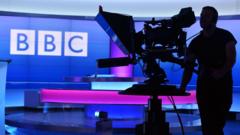BBC TV Licence Fee to Increase, Government Announces Funding Review
The UK government has announced a £5 increase to the TV licence fee, bringing the total cost to £174.50 in 2025, while simultaneously launching a comprehensive review of the BBC’s future funding model.
The price rise, set to take effect in April, is notably lower than the previous year’s £10.50 increase. This adjustment is part of an agreement made in 2022 to align the licence fee with annual inflation rates until 2027. The government has returned to calculating increases using an annual inflation rate, moving away from the monthly calculation used last year.
In a move to support households facing financial challenges, the government will expand the Simple Payment Plan (SPP) scheme. An additional 9,000 households will now be able to split their annual licence fee into more manageable fortnightly and monthly installments.
Culture Secretary Lisa Nandy emphasized the importance of the BBC, stating that the broadcaster provides crucial programming including children’s education, entertainment, and trusted news across the UK. She highlighted the upcoming Charter Review as an opportunity for “an honest national conversation” about the BBC’s long-term future.
The Department for Culture, Media and Sport (DCMS) has decided to discontinue a previous government’s review of the BBC’s funding model and will disband its expert panel. Instead, the funding issue will be examined as part of the charter review process before the current royal charter expires in 2027.
The charter review will incorporate independent expert advice, stakeholder views, and public consultation to determine the best approach to supporting the BBC’s future. Nandy expressed her desire to see the BBC thrive for decades to come, emphasizing the need for a sustainable public funding model that is fair and responsive to those who pay for it.
In a related development, Foreign Secretary David Lammy announced an additional £32.6 million in funding for the BBC World Service for the 2025-26 period.
The BBC’s royal charter, which typically lasts around ten years, sets out the terms and purposes of the broadcaster’s existence. The upcoming review will be critical in determining its future funding and operational framework.
This announcement comes at a time of significant discussion about public broadcasting’s role and funding in the digital age. The government’s approach suggests a careful balancing act between supporting the BBC’s vital public service role and addressing financial concerns of licence fee payers.
The incremental increase and expanded payment options aim to provide some financial relief to households while maintaining the BBC’s funding stability. The forthcoming Charter Review is expected to be a pivotal moment in defining the broadcaster’s future direction and funding model.




